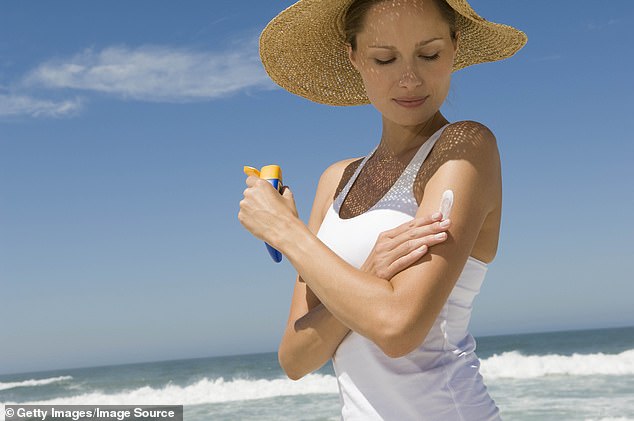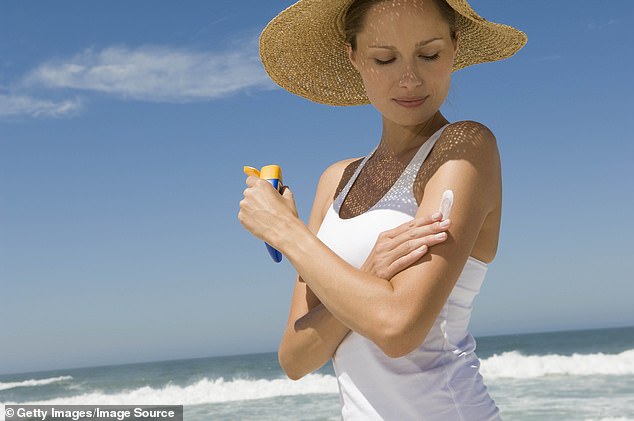Six Unexpected Ways Your Beauty Regime Reacts to Sunlight — From the Supplement That Could Be Harmful to Your Eyes to the Cream That’s Giving You Wrinkles





Heading for a late night break to warmer climes or enjoying the last rays of sunshine in the UK? Be aware that your usual cosmetic creams and supplements can react negatively to sunlight.
“People don’t realize that the ingredients you put on your face and body can make your skin more sensitive to the sun,” says beauty expert Dr. John Quinn of Quinn Clinics.
From spot creams that can age your skin to supplements that make you wear sunglasses and fragrances that can cause rashes, our experts reveal the six ways your wellness routine could be negatively impacting your…

Some creams can make your skin more sensitive to the sun
CITRUS SMELLS DANGEROUS
You might think that applying a little essential oil is a perfect way to perfume your summer – but natural isn’t always safe. Certain essential oils are phototoxic, meaning that when applied to skin that is then exposed to UV rays, they can cause sensitivity leading to redness, rashes and itching.

Dr. Mervyn Patterson
Citrus oils in particular contain furanocoumarins, substances found in many cosmetic products.
Although furanocoumarins are useful in treating certain skin conditions, they can cause rashes and even blisters.
In some countries there are restrictions. In 2003 the European Commission determined that sunscreens may not contain more than 1 mg/kg.
“Anything with a citrus scent is likely to contain them,” says beauty expert Dr Mervyn Patterson of Woodford Medical.
“Cover any area you’ve applied them to or only use them at night. And always wear SPF.”
AN EYE ON ST. JOHN’S WORT
This popular supplement is a natural antidepressant used to treat anxiety, low mood, and PMS. But be careful. “Hypericin and other compounds can increase the skin’s response to UV light and make the skin more sensitive,” says Dr. Nabila Jones, an optometrist at Optegra.

Dr. Nabila Jones
It can also affect unprotected eyes. A less discussed side effect is photosensitivity of the eyes, which can cause discomfort in bright light.
In severe cases, this condition, called photophobia, can potentially contribute to cataracts or macular degeneration.
If you use St. John’s wort, avoid direct sunlight, wear protection such as sunglasses, and consult a doctor if you experience any eye problems.
LEAVE THE LASERS BEHIND
As tempting as it may be to make some small changes before the holidays, such as laser treatments to improve your skin’s appearance, experts recommend postponing more serious cosmetic procedures until winter.
“We also recommend not having laser hair removal on areas where the skin is exposed to the sun,” says Dr. Quinn. “It makes the skin vulnerable, which can lead to redness, burning and increased pigmentation.”
BE CAREFUL WITH THE SUN VITAMIN
Since we need sunlight to create it, there have been some surprising cases of dangerously high levels of vitamin D in the UK. This vitamin has essential benefits for bones and the immune system, but a large percentage of us are deficient (and it’s recommended that we all take a supplement in the winter). We get some through our diet, but many of us also take a supplement. The safe upper level is 100mcg/4000IU for adults.

Dr. Oliver Guttman
‘Vitamin D is fat-soluble and so is stored in the body, even if only for a few months. This means that vitamin D levels can build up to dangerous levels,’ says nutritionist Emma Bardwell.
“Too much vitamin D can lead to calcium buildup (hypercalcemia), which can be harmful to the bones, kidneys, and heart. Complications are rare, but read labels to understand dosages, especially if you are taking a multivitamin on top of separate vitamin D.”
“In extreme cases, hypercalcemia can damage the blood vessels and cause the heart to beat too fast or too slow,” said Dr Oliver Guttman, a cardiologist at Wellington Hospital.
The NHS website states that you cannot overdose on vitamin D from sun exposure. Whether or not you can take a supplement on holiday depends on your individual level.
“Some people need to supplement year-round, as vitamin D synthesis through the skin is not always easy. Additionally, we can become less efficient at making vitamin D as we age. But each person’s needs are unique. The best option is to have your levels tested so you know if you’re within range or not,” says Bardwell.
NOTE VITAMIN A
All retinoids, or vitamin A, accelerate cell turnover and are widely used in night creams. Ironically, they also make the skin more vulnerable to pigmentation and sunburn.
“A new regulation means that the amount of retinol available in over-the-counter products is being reduced,” says Dr. Patterson. “However, you should still make sure you wear a high SPF when using them and avoid direct sunlight on your face.”
DISCOVER YOUR LOCAL TREATMENT
Benzoyl peroxide, which is found in many spot and acne treatments, works by killing bacteria on the skin — and shouldn’t be mixed with UV rays. “It’s very effective, but it also creates free radicals and can cause redness and premature aging — it’s like going out in the sun unprotected,” says Dr. Patterson.
Teens use these products the most and are uncomfortable with not having to cover up. However, Dr. Patterson stresses that if you are using a product with benzoyl peroxide to treat your pimples, “use a high SPF and stay out of direct sunlight as much as possible.”




